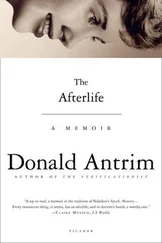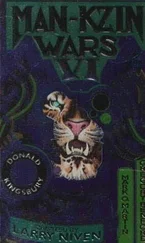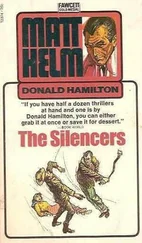“Look,” I whispered to the man holding me.
“What?”
“The hospital.”
“What about it?”
“It’s a spaceship.”
Bernhardt scolded, “Tom, knock it off. The hospital is not a spaceship.”
“Ask Manuel if you don’t believe me,” I said, then asked Manuel myself. “Escobar, is the hospital a spaceship?”
The Kleinian gazed out the window at the building in the clouds. He was thinking. Finally he answered, “Yes.”
It was as if Manuel’s saying this made it true. No one spoke for a moment; we all peered out the window above the booth, Maria and Manuel, Richard and I; and the mist rolled in and thunder sounded again; and suddenly I felt myself shooting up into the air — absolutely up and away, around and around beneath the ceiling’s grimy white tiles, without even trying.
Lights flew past. Or, more accurately, I flew past the lights, barely missing most. Looking down, I could see the people in the room looking up, watching me learn to fly. I cruised over Sherwin Lang and Sherwin saw me and smiled, and this pleased me, and for an instant I forgot to pay attention and nearly banged into a decorative cast-iron skillet hanging from a hook over the child psychologists. I did a little dip and roll around the skillet, and the psychologists all ducked. I saw Elizabeth Cole at three o’clock. The lights near the ceiling were exceptionally bright and hot. Below me was the fish tank. I made a mental note to swoop down and snag, from a table, any table, toast or a muffin, then circle back and dive-bomb the child psychologists. Elizabeth waved and I lost her in the lights and had to look away, and this almost caused another accident when Dan Graham got up to go to the men’s room. Dan is a heavy man with a long beard; he looked, that night, in his flannel shirt and jeans and orthopedic shoes, as if he could hurt you in a fight. In fact, Dan is an avid rider of Harley-Davidson motorcycles. It is always interesting to observe the ways people style themselves to fit the roles suggested by their passions and hobbies. Dan with his tied-back hair and his thick arms and huge gut walked — limped, actually; the man’s right leg was significantly shorter than his left, necessitating the special shoes — Dan limped directly into my path, and it was luck more than skill when I sheared hard to the right past his head and straight toward Maria, the only person in the restaurant able to make me feel safe and loved. It would have been heavenly to drop into Maria’s arms; but this was not to be. The kitchen doors opened, spilling light from behind, and out came our waitress, our beautiful Rebecca, carrying water glasses on a metal tray. Rebecca set out between the crowded tables. Everything was fine until Sherwin signaled for a waitress, and Rebecca, seeing him, picked up speed. I was certainly going to fly straight into her. I would not have minded this if it had not been for the water glasses and the likelihood of a noisy accident. In fact, Rebecca was probably accustomed to boys her age concocting awkward excuses to barge into her — the old adolescent game of sexual touching disguised as rough, schoolyard teasing and playing. However, it would not be right for me, a grown man occupying a position of so-called responsibility in the community, to mow down a high-school girl making money for college. It’d be nice at least to zoom in close and smell her hair. What could be wrong with that? She was not far, only three or four short steps, from Lang. The child psychologists watched her saunter by their table; and it was obvious that Konwicki, in particular, was checking out her ass. But who could blame the man? Rebecca looked good — no, fantastic —in her waitress’s uniform. The uniform itself was, unfortunately (or fortunately, depending on one’s preferences in women’s fashions), quite prim: blue gingham dress coyly hemmed above pretty knees; billowing sleeves finished with lace cuffs buttoned at the wrists; a high lace collar above white clasps running up (or trailing down; again, a great deal depends on how you see these things) the front. You can’t expect waitresses wearing miniskirts and black tights at a pancake restaurant. I, for one, am charmed by the theater of supposed innocence, and have no objection to drab costumes on females. What is more beautiful than beauty unveiled? Who can honestly deny the urge to breach a virtuous façade?
Here Rebecca came. We were on our collision course. I wanted to tackle her and get tangled up in her clothes. The realization of this desire made me wiggle and shake. Did Bernhardt notice this? Would he mind? Dan Graham lumbered out of the men’s room, and Rebecca stopped suddenly to let him pass. Rebecca’s waiting gave me an opportunity to fly by without adjusting altitude. Dan made his way to his chair and I missed Rebecca by inches, then buzzed over Sherwin Lang for the second or maybe third time that night. “What was that?” Leslie Constant’s English-accented voice said, as I screamed past the fish tank and nearly smashed into a window overlooking the parking lot.
I was not, at this point, making a very good showing as a flying man. I might have done better if I had not eaten the pancakes. We eat pancakes to escape loneliness, yet within moments we want nothing more than our freedom from ever having so much as thought about pancakes. Nothing can prevent us, after eating pancakes, from feeling the most awful regret. After eating pancakes, our great mission in life becomes the repudiation of the pancakes and everything served along with them, the bacon and the syrup and the sausage and coffee and jellies and jams. But these things are beneath mention, compared with the pancakes themselves. It is the pancake— Pancakes! Pancakes! — that we never learn to respect. We promise ourselves that we will know better, next time, than to order pancakes in any size or in any amount. Never again will we be tempted by buckwheat or buttermilk or blueberry flapjacks. However, we fail to learn; and the days go by, two or three weeks pass, then a month, and we forget about pancakes and their dominion over us. Eventually, we need them. We crawl back to pancakes again and again.
I slumped, midair, against the window frame. Outside were cars parked in the lot. The night beneath approaching rain clouds was black beyond reach of the restaurant’s outdoor lights. Mist turned to thicker fog, covering cars. The cars in the light glowed beneath the gray, obscuring fog; they seemed, somehow, these cars, to glow and vanish at the same time. Tires on the ground were invisible, though bumpers, hoods, and windshields shimmered in the wet air. Nothing much could be seen beyond the last row of automobiles. Tree trunks. A patch of brown grass. The electric outdoor light dissipated in mist, and colors on faraway cars were muted and indistinguishable. The car bodies were wet hulks. I could see, close to the restaurant building, Maria’s yellow sports coupe parked beside Bernhardt’s red station wagon. Bernhardt’s red wagon became purple in the dull light. This car was a flagship; others behind and around it looked small and vulnerable. I could not help feeling sad for the cars.
My own car, my little green sedan, was not in the lot, because Jane had driven me here and dropped me off.
I felt sick and alone, looking out at cars and eavesdropping on the child psychologists, whose voices were so loud.
“He’s borderline. I’m sure of it,” said Peter Konwicki to the man beside him, an earnest, irritating trainee named Bob. Bob nodded his head and Konwicki said, “I don’t like to diagnose my coworkers, but in this case I’m willing to make an exception.”
“Would you say that he is a multiple?” asked Bob in his eager, ingratiating way — trying, I guess, to score points with Konwicki.
Читать дальше












